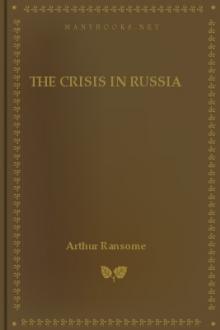The Crisis in Russia, Arthur Ransome [classic book list .TXT] 📗

- Author: Arthur Ransome
- Performer: -
Book online «The Crisis in Russia, Arthur Ransome [classic book list .TXT] 📗». Author Arthur Ransome
On this there is only one thing to be said. If, whether because we do not trade with them, or from some other cause, the Russians are unable to proceed even in this first stage of their programme, it means an indefinite postponement of the moment when Russia will be able to export anything, and, consequently, that when at last we learn that we need Russia as a market, she will be a market willing to receive gifts, but unable to pay for anything at all.
And that is a state of affairs a great deal more serious to ourselves than to the Russians, who can, after all, live by wandering about their country and scratching the ground, whereas we depend on the sale of our manufactured goods for the possibility of buying the food we cannot grow ourselves. If the Russians fail, their failure will affect not us alone. It will, by depriving her of a market, lessen Germany’s power of recuperation, and consequently her power of fulfilling her engagements. What, then, is to happen to France? And, if we are to lose our market in Russia, and find very much weakened markets in Germany and France, we shall be faced with an ever-increasing burden of unemployment, with the growth, in fact, of the very conditions in which alone we shall ourselves be unable to recover from the war. In such conditions, upheaval in England would be possible, and, for the dispassionate observer, there is a strange irony in the fact that the Communists desire that upheaval, and, at the same time, desire a rebirth of the Russian market which would tend to make that upheaval unlikely, while those who most fear upheaval are precisely those who urge us, by making recovery in Russia impossible, to improve the chances of collapse at home. The peasants in Russia are not alone in wanting incompatible things.
End of The Project Gutenberg Etext of The Crisis in Russia, by Ransome





Comments (0)